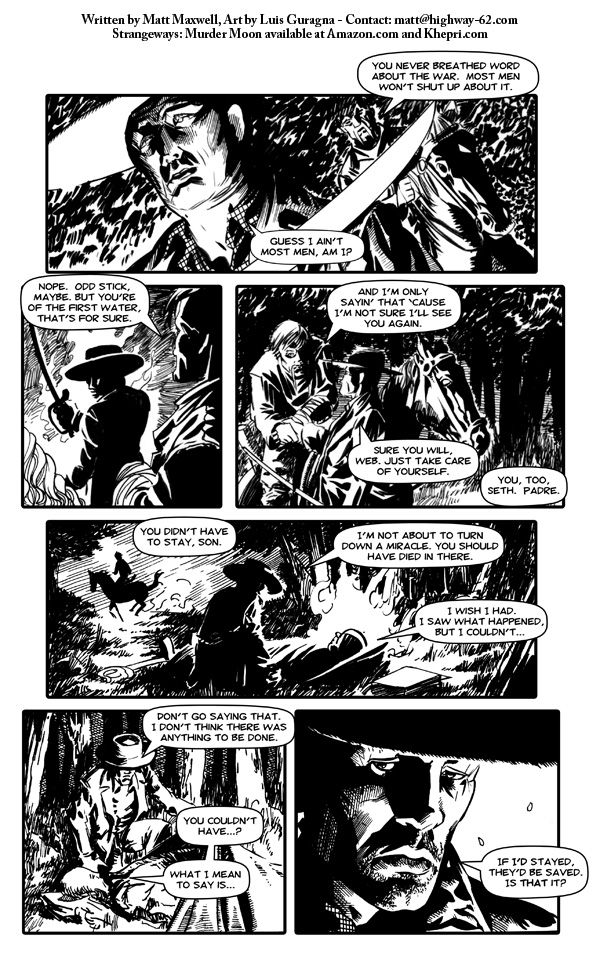Bless my soul, is that Robert Mitchum in the first panel?
Commentary after the jump.
At least it wasn't Clint Eastwood. I mean, Clint's as badass as they come, but Mitchum gets completely passed over when it comes to modelling western heroes. Granted, Clint was the guy that broke the mold (well, Leone was, but Clint was the actor most clearly associated with it) so that's probably why he sticks in people's minds.
If'n you want to know the truth, I'd have cast Burt Lancaster in the role of Collins. He could do that haunted thing. Mitchum might be too forceful for what I had in mind, but I'd not have complained given a time machine and an opportunity to cast him.
So, here we have Collins not only confessing his former life as a soldier, but that he didn't trade on it, given the opportunity. This seems to me to be a pretty defining character trait. Well, that and the fact that maybe he's not just unwilling to trade on it, but that he doesn't want people to know about it. Maybe something bad happened back during the War. Maybe.
Huh. I used "sure" about three too many times in that dialogue in the second row there. I really should learn to proofread.
But other than that, the dialogue does pretty well. You'd be surprised how many expressions I didn't actually make up. I've had a number of people compliment me on the realistic nature of the dialogue (some of them wisely say "effective") 'cause it's about as accurate as Shakespeare's was. My guess is that if I took the effort to do 100% accurate to the period dialogue, it'd be 1) not particularly readable and 2) not much fun. I'm not a cultural anthropologist or historian. I do however, listen to how people talk (sure, I do) and know that there's a lot of shortcuts going on in language, particularly when spoken, and that people sometimes like to make up interesting phrases to spice things up.
In short, don't let the truth get in the way of a good story. There's a number of western slang sites out there, and I've perused them, but I don't study them religiously. I don't pepper every phrase with era-appropriate language. I do try to keep the dialogue readable, however, and I do try to spice it with some authenticity (or at least something that sounds authentic) from time to time to anchor things in the period. I'm pretty sure that there's more linguistic anachronisms than not. I'm okay with that.
You'd think, that lookng at most of the page, that Luis doesn't really do facial expressions. Aside from the closeup in the first panel, the faces are minimal, sketchy. And it serves the art decently, but when you hit that last panel, with the tight zoom in on Collins, and the detailed expression in the firelight, you really get it then. Abstract gets contrasted with concrete, making the concrete that much stronger when you finally get to it. Don't be afraid to mix up your style on the page to make a point or to make it stronger. This isn't something that you necessarily think out beforehand, but can present itself as the page is being made up. I certainly didn't call it out in explicit detail in the script, but it does work very effectively when you actually read it.
Okay, time for back-to-school shopping for the kids. Did I mention that I can't wait for the kids to get back to school? Four whole hours by myself to work every day? I don't know that I've worked four hours in a single sitting since June.
Back on Wednesday.


